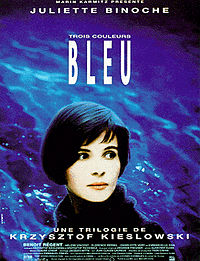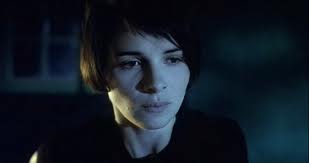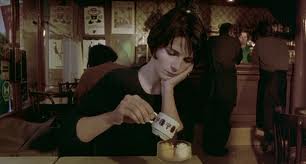My Writings

Review - Three Colours Blue (1993)
1993 saw Kieslowski complete two outstanding masterpieces of European cinema, The Double Life Of Veronique and Three Colours Blue. Juliette Binoche had been unable to accept the director's invitation to appear in the former as she was already acting in Les Amants de Pont Neuf. Happily for all concerned the two got together to make Blue, whilst Irene Jacob, star of Veronique, went on to make Three Colours Red with Kieslowski the following year. Trust established between director and actress is an important ingredient, and especially when you consider Binoche is handed an extremely difficult acting assignment here. Her character (Julie de Courcy) is involved in a car accident which claims the lives of her husband, a world famous composer, and her 5 year old daughter. Weighed down by grief, Julie, after finding herself unable to commit suicide, systematically disassociates herself from her past, retreating to a Parisian suburb, living alone. Her one connection with the outside world is her daily visit to the local coffee shop where she listens to a skilful busker playing the flute.
Latest Works

Slowly Julie re-connects with the world, but this is not a movie about a plot, it is an evocation. Kieslowski relies on the skill of his actress to give resonance to his clever use of imagery. Binoche does not let him down with a career best performance, deep and transfixing, lacking cliche, and with the use of subtle charisma she nails the character, so that we are mesmerised and deeply sympathetic.

A third important aspect of the film's appeal is an excellent soundtrack from regular musical collaborator Zbigniew Priesner. Binoche's composer husband, we learn, has been invited to write an important symphony to be played at the inauguration for the Unification of Europe. Binoche tries to destroy the work because it transpires she was an integral part of her husband's work, and she is determined that she must disconnect with her past if she is to prevail.
The final scene, where Julie shows the strength of her character and we see the faint glimmer of a smile amongst the tears as she listens to the re-written composition playing in the background, is a very satisfactory finale. Blue is the first instalment of Kieslowski's trilogy, about the three French revolutionary ideals, representing freedom, but is probably more to do with hope or the human spirit. Kieslowski does not quite attain the cinematic heights evidenced in Veronique but this is sublime cinema.
10/10 Expertly composed
Review written by John Franklin : January 2012
back...